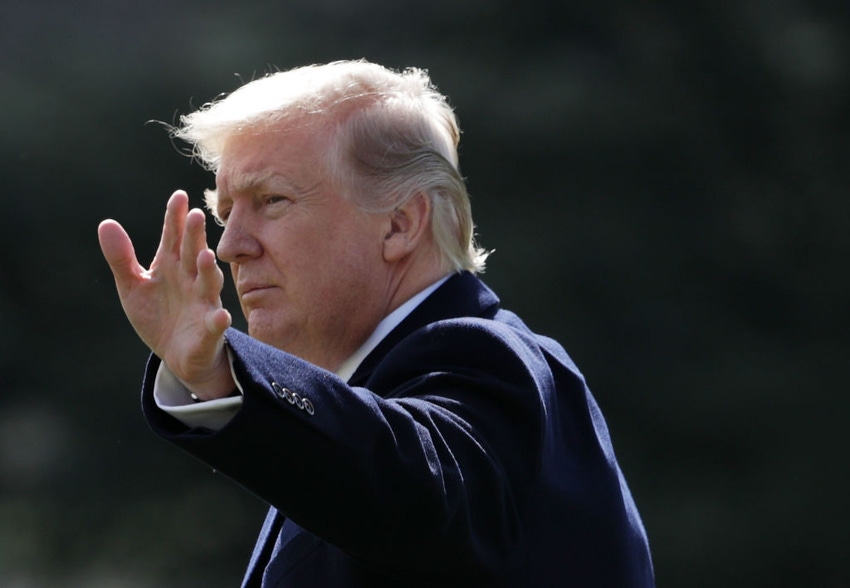We got tax and regulation cuts. Now we have to deal with the bad Donald when it comes to trade.
March 9, 2018

Someone asked me a few days ago, “Who is Peter Navarro and why should I care?”
The answer then was that he had been demoted in the White House hierarchy months ago and free traders were very happy, because Navarro was probably the most protectionist economist in the country. Locked in the basement somewhere with no one listening to him was extremely beneficial to the economy and trade.
A couple days later, the answer changed completely. Navarro had been promoted, had obviously won the White House war over tariffs and President Trump jumped the gun and announced he was going to impose steel (25%) and aluminum (10%) tariffs.
On top of that, the President’s chief economic advisor, free trader Gary Cohn, decided losing the tariff argument was the final straw and announced he was resigning.
Even more distressing, the short list to replace Cohn included Navarro. It also includes, so the story goes, Larry Kudlow, who is certainly a free trader and a talented explainer of economics in real terms.
We did get one piece of good news personnel-wise in recent days. Gregg Doud, former chief economist for the NCBA and former staffer for Sen. Pat Roberts, got his confirmation vote on the Senate floor and will be installed as chief agriculture negotiator with the U.S. Trade Representative’s office. Having a free trade advocate with extensive knowledge of agriculture will help balance USTR Robert Lighthizer’s positions that are more protectionist.
Bad Donald?
Going back to the presidential campaign, our opinion was that when it came to trade, Donald Trump was fixated on jobs, rather than overall economic growth, recognition of comparative advantage and resources among countries and the constant churn of ideas, processes and jobs in a free economy. We also knew that his ideas on supply-side economics, including cutting taxes and deregulation, were spot on. We got tax and regulation cuts. Now we have to deal with the bad Donald when it comes to trade.
Trump’s degree in college was in economics, not history. But economic history certainly teaches us that tariffs do not work. They hurt economic activity, they trigger retaliatory tariffs in unrelated industries, they interfere with the workings of free markets, they shelter industries from competition and stifle their creativity and, most importantly, they damage the very people a country’s economy is supposed to serve—its consumers.
In order to supposedly help the workers in one industry, tariffs instead tax the entire rest of the work force (158 million) and the population of 323 million. There can be no more accurate analogy of this economic fiasco than “cutting your nose off to spite your face.”
Only targeted, short-term tariffs have been effective in penalizing countries for specific trade law violations. But blanket tariffs hurt everyone, including, in the long run, the industry the tariffs were designed to help. Insulated from competition, freed from the constant pressure to improve, to innovate, to push, that industry tends to fall behind competitors in other countries and ends up in worse shape than before.
Perhaps the best news for agriculture was hints and then finally, words from President Trump himself, that Canada and Mexico would be exempt from the tariffs during the re-negotiation of NAFTA. If we get an agreement the President likes, the exemptions would continue. We’re not sure how Canada and Mexico will feel about having more pressure applied to them but there is no doubt that the incentive will be on their minds.
Over 100 Republican Congressmen signed a letter to President Trump, asking him to back off broad tariffs to prevent damage to American consumers and making industry less competitive. Even 60 Democrats signed another letter, at least asking for hearings on a change in trade policy.
Meanwhile, the White House staff was scurrying around putting together an explanation of the mechanism. Navarro has concocted some kind of system wherein countries would be invited to offer concessions in order to be excluded from the tariff.
However, for every country removed from the list for some good reason, the tariff will have to be ratcheted up on the remaining countries to continue the protection goals the Administration has set, according to the Wall Street Journal.
Congressional support needed
Amid all this flurry, President Trump, especially near term regarding NAFTA, should bear in mind he needs Congressional support for his trade policies in order to do the trade deals he wants to do. For one reason, any new NAFTA agreement is a treaty that must survive an up or down vote in Congress. U.S. negotiators must fashion an agreement both Canada and Mexico can live with plus please a majority of Congressmen and their constituents.
Secondly, Trade Promotion Authority (TPA) expires July 1. The President must file a formal request to extend that authority by April 1, just a few weeks from now. Either house of Congress can introduce a resolution to forbid the automatic renewal of the president’s trade authority.
Given the rocky relationship with some congressmen, getting by such a hurdle could be difficult. The House only barely granted TPA to the president in office under Bush and Obama. Negotiations far enough along in the process are allowed to be concluded under the rules but no new ones begun. That could impact the bilateral deals the administration promised to replace multi-lateral deals it didn’t like, such as TPP or TTIP.
The President invited the steelworkers and union leaders to say a few words at the signing ceremony. Several blamed trade for closed plants and lost jobs, but not a one mentioned changing steel production methods, tax burdens, environmental problems or union demands pushing wages over $90,000 per year. As I pointed out during the campaign, addressing the tax and regulatory burdens will do more for those and other industries than all the tariffs in the world.
The bottom line is this is being done to aid 200,000 steel workers versus the 7 million workers who will be hurt in steel-using industries. The bigger number is the American consumers hurt by rising steel prices. And in a war, there are many places we could buy steel and aluminum—unless we REALLY tick off Canada and Mexico.
And it is easier to ramp up production now under new processes. One Australian steel plant today producing 500,000 tons with 14 workers require 1,000 workers in 1960. Times change.
Since the beef industry does little business with the EU, any damage there should be minimal. They could be in line for future negotiations, as the U.S. has certainly been abused by EU trading rules.
And yes, since you asked, R-CALF did come out asking for import tariffs on cattle, beef, sheep and lamb.
Steve Dittmer is a longtime industry commentator and principal of the Agribusiness Freedom Foundation.
About the Author(s)
You May Also Like





